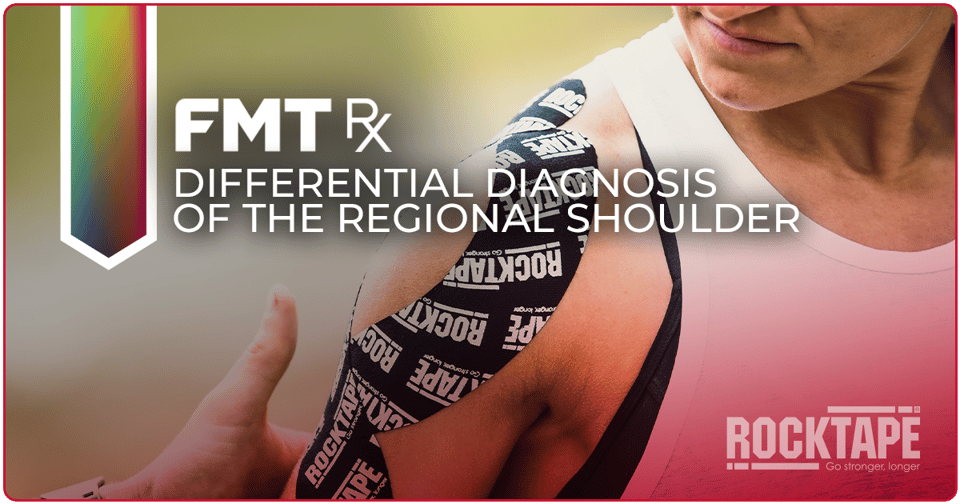FMT Rx: Differential Diagnosis of the Regional Shoulder
by Dr. Milica McDowell

Description
This course introduces the learner to an overview of differential diagnosis and intervention concepts related to the shoulder region of the human body. It includes a review of current literature supporting the theories that describe and delineate specific concepts related to differential diagnosis of this body region. Interventional techniques to enhance rehabilitation or performance outcomes will be discussed and demonstrated. Evidence based chapters in this course include topics of tissue healing, injury management, differential diagnosis, interventional technique, treatment theory and practical lab experiences in areas such as applying kinesiology tape, use of myofascial cups, using banded mobilizations and IASTM.
FMT RX: Regional Shoulder is an evidence-informed differential diagnosis course that advances students’ understanding of factors to consider when working with patients or clients with hip region injuries. FMT Rx Regional Shoulder methodically examines the research-influenced content basis for a deeper understanding of management of this area of injury.
This course is intended for health and fitness professionals with all levels of experience.
Learning Objectives
Course Content
| FMT Rx: Regional Shoulder | Module |
Milica McDowell DPT

Dr. Milica McDowell is the Senior Director of Medical for RockTape, her background is as an orthopedic physical therapist. She has worked with athletes from high school kids to the weekend warrior to pros from the NFL, NHL, MLB, XGames, Pro rodeo, triathlon, and the performing arts. Dr. McDowell has a background in team sports, yoga, Pilates, CrossFit, clinical bike fitting and rehab for ultra-endurance athletes. Dr. McDowell was a faculty member at Montana State University in the Health and Human Performance program from 2008-2019 and is the founder of Epic Fitness Center, Bluebird Medical Supply and Clearwater Physical Therapy. Dr. McDowell has two Bachelors’ Degrees from Montana State University, a Master’s Degree from University of Colorado and Doctorate in Physical Therapy from Idaho State University. She has lectured both nationally and internationally, is a published author, textbook editor and has a United States Patent. In her free time, she enjoys triathlon, alpine and skate skiing and exploring Montana’s outdoors with her husband, family and poodle-mix dogs.
Hour 1:
- Review of Anatomy and Physiology
- Regional Shoulder Anatomy
- Anterior Shoulder/Upper Trap Complex
- Superior Shoulder/Upper Trap Complex
- Pec and Clavicle Complex
- Lateral Shoulder Complex
- Regional Shoulder Biomechanics
- Proximal and Distal Influences
- Regional Shoulder Function
- Area of Stability & Mobility, Compare and Contrast
- Differential Diagnosis of the Shoulder Region
- Medial Shoulder Compartment, Common Palpation and Testing
- Lateral Shoulder Compartment, Common Palpation and Testing
- Posterior Shoulder Compartment, Common Palpation and Testing
- Superior Shoulder Compartment, Common Palpation and Testing
- Function and Dysfunction of the Regional Shoulder Complex
- Identifying the Issues
- Medial Shoulder Compartment, Common Issues
- Lateral Shoulder Compartment, Common Issues
- Posterior Shoulder Compartment, Common Issues
- Acute Trauma vs Chronic Problems
- Historical Treatment of Regional Shoulder Pain
- Anterior Shoulder/Biceps Complex/ACJ
- Superior Shoulder/Upper Trap Complex
- Pec and Clavicle Complex
Hour 2:
- Research Review
- Analysis of Current Research Related to this Region
- Treatment Considerations Today
- Kinesiology Tape Intervention
- Shoulder Posture Tape Applications
- Myofascial Cupping
- With Movement
- With Therapist Assist
- With Postural Articulations
- IASTM for Shoulder
- Down Regulation of Pectoralis
- Up Regulation of Latissimus
- Down Regulation of Upper Trap
- Elastic Conditioning Band Interventions
- Retractions and Shoulder Mobility Glides
- Stages of Care for Regional Shoulder Pain
- Acute Management
- Sub-acute Management
- Chronic Management
- What’s Next
- Review of Learning Objectives
PT/PTA
This course meets continuing education requirements for these State Physical Therapy Boards: AL, CO, CT, IA, ME, MA, MN, NH, OR, SD, UT, WA, WY
This course meets continuing education requirements for these State Physical Therapy Boards by virtue of approval by Texas Board of Physical Therapy Examiners for 2.00 CCUs for PTs and PTAs. Approval #71710: AK, AZ, DE, GA, HI, ID, IN, MI, MS, MO, MT, NC, ND, PA, RI, SC, TN, VA.
KY – This course is Category 2 continued competency activity by the APTA Kentucky. Category 2 activities include courses that are less than 3 hours in length; these courses do not require formal approval.
ATC
This course (BOC Approved provider # P8570) is approved by the Board of Certification, Inc. to provide continuing education to Certified Athletic Trainers. This program is eligible for a maximum of (2 hours/CEUs, Category A). ATs should claim only those hours actually spent in the educational program.